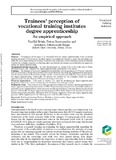| dc.contributor.author | Athanasoula-Reppa, Anastasia | |
| dc.contributor.author | Brinia, Vasiliki | |
| dc.contributor.author | Stavropoulos, Petros | |
| dc.date.accessioned | 2019-04-22T12:04:53Z | |
| dc.date.available | 2019-04-22T12:04:53Z | |
| dc.date.issued | 2018 | |
| dc.identifier.issn | 2042-3896 | |
| dc.identifier.uri | http://hdl.handle.net/11728/11417 | |
| dc.description.abstract | Purpose – The purpose of this paper is to investigate how the degree apprenticeship of the vocational
training institutes (VTIs) enhances the labor market and enables the trainees to detect the knowledge and
skills that are acquired during the training. In addition, this study tries to detect through work-based learning
whether the workplace function as a learning place and whether the trainees are satisfied by the experience
during the degree apprenticeship.
Design/methodology/approach – In total, 129 graduates by various VTIs in the wider area of Patras
(Western Greece), who completed the degree apprenticeship, participated in the survey.
Findings – The findings of this study highlighted the difficulties that the graduates of VTIs face when they
look for a job in the economic crisis era that Greece faces. However, this study also highlighted the satisfaction
that the trainees denoted about the knowledge and the vocational and social skills that they acquired during
the degree apprenticeship. Additionally, the trainees are satisfied by the workplace where the degree
apprenticeship took place because it became a learning environment.
Practical implications – This study is evidence of a need for developing the degree apprenticeship
programs in Greece as a means of enhancing the transition from training to work.
Originality/value – This research is the first and serious recording of the trainees’ opinions regarding their
degree apprenticeship, during their studies in VTIs. The presented professional and social skills could use as
guidelines for the implementation of new practices and educational policies in training during the educational
process. Additionally, the degree apprenticeship programs will be further linked to the educational institution
and the educational community will benefit from the trainees’ experience. These new degree apprenticeship
practices will be implemented in the following years in all the VTIs in Greece. | en_UK |
| dc.language.iso | en | en_UK |
| dc.publisher | Emerald Publishing Limited | en_UK |
| dc.relation.ispartofseries | Higher Education, Skills and Work-Based Learning;Vol. 8, issue 4 | |
| dc.rights | © Emerald Publishing Limited | en_UK |
| dc.rights.uri | http://creativecommons.org/licenses/by-nc-nd/4.0/ | en_UK |
| dc.source.uri | www.emeraldinsight.com/2042-3896.htm | en_UK |
| dc.subject | Research Subject Categories::HUMANITIES and RELIGION | en_UK |
| dc.subject | Work-based learning | en_UK |
| dc.subject | Trainees | en_UK |
| dc.subject | Workplace | en_UK |
| dc.subject | Labour market | en_UK |
| dc.subject | Degree apprenticeships | en_UK |
| dc.subject | Higher education skills | en_UK |
| dc.subject | Vocational training institutes (VTIs) | en_UK |
| dc.title | Trainees’ perception of vocational training institutes degree apprenticeship: An empirical approach | en_UK |
| dc.type | Article | en_UK |
| dc.doi | 10.1108/HESWBL-10-2017-0074 | en_UK |


